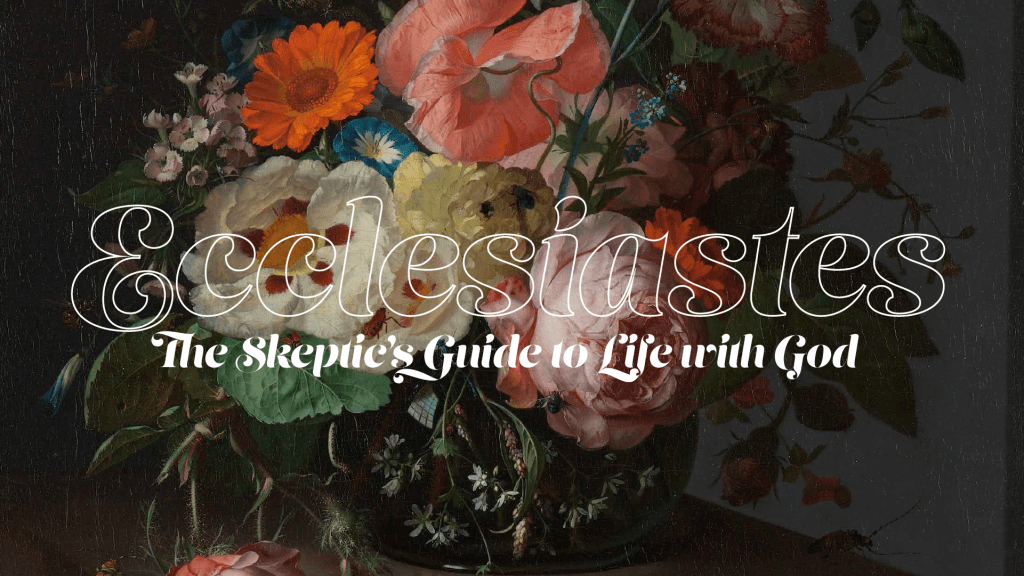
In a letter to early Christians in the cosmopolitan city of Corinth, the Apostle Paul writes these striking words:
“For the message of the cross is foolishness to those who are perishing, but to us who are being saved it is the power of God.” (1 Corinthians 1:18)
How can it be that this message – this gospel – can be foolishness to one group of people while simultaneously reflecting God’s power to another group people ? How can it be that on the one hand some people discount the message of the Cross as utter stupidity (the Greek is the same root word from which we derive our word “moron”) while on the other hand another group of people would describe it as the wisdom of God?
I believe it is both puzzling and somewhat understandable. Let me lead us into a five-part reflection on aspects of the crucifixion of Jesus which could be seen as utter foolishness and yet reveal the power and wisdom of God.
First, in His incarnation, which leads to the crucifixion, Jesus the Messiah took on human flesh so that God might restore broken humanity from the inside out, bringing us back to God.
The insurmountable gap between a holy God and a sinful humanity could not be crossed from the human side. It required God’s initiative. Not only did it require God’s initiative, but as God took initiative He did so by doing something utterly shocking and apparently incomprehensible. God entered human experience and life to bring human life back to Himself from the inside. God took on human flesh and bone and, in a sense, lived in our skin. God entered the everyday aspects of flesh-bound human experience. As Eugene Peterson captures it in The Message, “The Word became flesh and blood and moved into the neighborhood” (John 1:14). Jesus lived a perfect human life within the flesh. He was not an alien being in our midst, but became one of us, to bring our everyday flesh-bound human experience back to God. Our everyday lives are made sacred with God because Jesus lived an everyday life for God, too.
Second, in the crucifixion, Jesus the Messiah died under sin’s power that we might be set free from sin’s power.
Since the time of Adam and Eve, humanity has been caught under the power and influence of sin. It is something we see and experience in the world around us: the violence of one person against another, injustice and prejudice that pit one group against another, the misuse of money that enriches some at the expense of others, the tendency of nations toward war, and so much more. We see and experience this same thing in ourselves: the way we desire what we should not have while ignoring the gifts right in front of us, the big and small lies we tell, the cycles of addiction we cannot seem to get free from, the hurts some inflict on us that warp our thinking and the hurts we inflict on others that do the same to them. We are, as it were, trapped in a prison of sin and brokenness. To remove someone from prison, you can send a message that they are free, but eventually someone must come and open the door. Someone must come into the prison to liberate the captives. And this is exactly what Jesus did.
Although it may seem strange or foolish to say that Jesus must die for our sins, Jesus could not deal with sin partially. He had to take the full effects of our captivity upon Himself. And if we, as human beings, are trapped in an endless imprisonment of sin that is not only a life sentence but also a death sentence, then Jesus must take that death sentence for us. And so, He enters the prison of sin, takes the death sentence due us and, through the crucifixion and resurrection, sets us free from a prison we could never escape from. “God made him who had no sin to be sin for us, so that in him we might become the righteousness of God” (2 Corinthians 5:21).
Third, in the crucifixion, Jesus the Messiah was beaten and torn that we might be healed and whole in God.
“How could it be,” some might say, “that God would not only enter our human experience and then be beaten and torn for us? If God was powerful, He would not allow such a thing to happen.” Yes, this seems far-fetched, perhaps even like a form of insanity, but God knows this is the only way. If broken human lives are going to be made whole, it requires more than a surgeon. If broken humanity is going to be made right, it requires more than someone watching from the outside and giving advice. In fact, it takes someone fully living life with God from within the human life, story, and experience. Otherwise, human beings might always say, “No, it is not possible for me to be whole. No, it is not possible for me to be healed. No, it is not possible for me to be made right.”
When a budding athlete wants to know how to excel at their sport, they look to those who have gone before them and have excelled. When a writer wants to know how to do their best at their craft, they look to those who have gone before and have mastered it. So, too, if we want to know how to live whole and healed in God, we need a picture of what that can look like, not in abstraction, but in flesh and bone. Jesus walks within human flesh and bone so that we see what it looks like and know, by God’s power, what is possible. Now we can say: “Yes, we can be healed in Christ. Yes, we can be whole in God. Yes, things can be made right through Christ.” As Isaiah the prophet tells us, “The punishment that brought us peace was on him, and by his wounds we are healed” (Isaiah 53:5b).
Fourth, in the crucifixion, Jesus was mocked and vulnerably exposed that we might receive a new identity and restored dignity with God.
One of the most apparently foolish things to claim about Jesus is that He was God while also living vulnerably on earth. In one sense, we know that God is vulnerable all the time. People say all sorts of things about God in the abstract and seem to get away with it. Some people bless God, but others curse God. Some people say wonderful things about God, while others say terrible things about God. Amazingly, God seems to handle all these things even while we don’t think much about it.
But on the Cross Jesus takes on another level of vulnerability. He is terribly mocked by several voices. He is derisively lampooned as the Messiah. He is sarcastically ridiculed as the Son of God. He is mocked in relation to His teaching. He is mocked in relation to His claims to power.
Beyond the vulnerability of mocking, on the Cross Jesus becomes vulnerable in an even more unimaginable way. I know you may have seen all sorts of artistic renditions of Jesus’ crucifixion, but I hope you don’t mind me telling you that Jesus was stripped absolutely naked to be crucified. Nakedness is the epitome of vulnerability and exposure. And here is Jesus, affixed to the Cross in public view, absolutely vulnerable and mocked.
Why would God do this? It may seem foolish. Yet God enters human vulnerability so that no matter what sorts of mocking or exposure we have endured, no matter how vulnerable we have been in our lives, we can know that God has been there too. The God of the universe entered the entirety of human experience, even our most vulnerable states, that He might breathe the spiritual breath of His Holy Spirit upon humanity even there. By faith He gives us a new identity as sons and daughters of the most High God, and says that we—mocked, exposed, vulnerable—are worthy of dignity from God. He went to great lengths to show us this.
Fifth, in the crucifixion and His death, Jesus the Messiah endured pain and separation from God that we might experience the love of belonging with God.
You may remember that at one point in His crucifixion, Jesus cried aloud, quoting Psalm 22, “My God, my God, why have you forsaken me?” (Matthew 27:46). Jesus experienced real physical pain, but that pain was surpassed by the rending of Jesus’ relationship with His Father. This is the Father that Jesus described at one point with this phrase: “I and the Father are one” (John 10:30). But on the Cross, Jesus experienced a chasm between Himself and the Father as He took our sin, our pains, our wounds, our mocking, our vulnerability, and more on Himself.
“How can this even happen? What foolishness is this?”, some might way. We respond, “Only God could do such a thing.” We were lost, like the prodigal son, in a far country, but Jesus the true Son came in search of us to bring us back to God. He experienced the agonizing pain of separation from God yet did so that we might find belonging and love in God. As we read in one of Paul’s letters, “So in Christ Jesus you are all children of God through faith” (Galatians 3:26).
So, ponder with me the wondrous message of the Cross. Consider with me the shockingly powerful reality of our crucified Messiah. Some may say that holding such a message as the heart of our faith is foolishness, but we can respond that this message truly is the power of God. Or, as the Apostle Paul continues:
Jews demand signs and Greeks look for wisdom, but we preach Christ crucified: a stumbling block to Jews and foolishness to Gentiles, but to those whom God has called, both Jews and Greeks, Christ the power of God and the wisdom of God. For the foolishness of God is wiser than human wisdom, and the weakness of God is stronger than human strength. (1 Corinthians 1:22-25)




